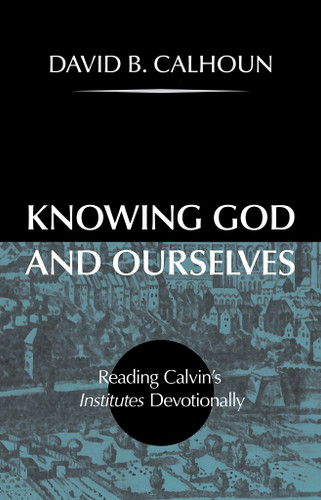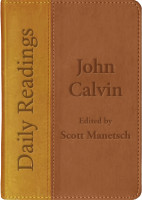
Knowing God and Ourselves: Reading Calvin's Institutes Devotionally (Calhoun)
- Affordable shipping (free $100+)
- 100,000+ customers served
- "Wonderful books, great prices, awesome customer service." – Ivan, IL
Description
The goal of Knowing God and Ourselves is to help students, especially beginning students, of Calvin’s Institutes of the Christian Religion to better understand what they are reading and to encourage them to persist in working through this important but challenging book.
Calvin intended the Institutes to be a guide in reading Scripture and a theological companion to his commentaries. Above all, he wanted his readers to respond to biblical truth with love for God and obedient lives. The subtitle of this book is Reading Calvin’s Institutes Devotionally. Reading the Institutesdevotionally is not merely one way of reading Calvin’s book. It is the only way to read it.
The sections in the Institutes to be read with each chapter of this book are clearly indicated. The reading assignments are from the McNeill-Battles edition of the 1559 Institutes; but if one prefers to use the briefer but ample 1541 French edition of the Institutes, translated by Robert White (and also published by the Banner of Truth Trust), the relevant chapter and page numbers for that edition have also been added to the ‘Read’ section at the head of each chapter in this guide.
‘By nature I love brevity’, Calvin wrote. The length of the Institutes may not seem to justify Calvin’s claim, but compared with many theologies, past and present, Calvin’s book is remarkable for its lucid brevity. David Calhoun has sought to follow Calvin’s advice in Knowing God and Ourselves. It is a short and lucid guide to Calvin’s Institutes, which, in turn, is a guide to the Bible.
‘I did not read Calvin’s Institutes until I was in my doctoral studies at Princeton Theological Seminary. I have been reading this book ever since, along with other writings by Calvin and books about Calvin. For twenty-five years, I taught a course in the Institutes at Covenant Theological Seminary. I do not idolize Calvin, but my respect for him as a teacher and pastor has grown through the years. Facing the daily task of living, with its many demands and pressures, struggling with incurable cancer, and trying to find a way to understand the chaos and grimness of world events unfolding around me, I have found Calvin a source of solidity and strength. Enjoying the gift of life, the blessing of love of family and friends, the joy of food and drink, the beauty of nature, and the wonder of it all, I have discovered in Calvin a fellow pilgrim whose words often reflected and focused my feelings and helped me to fix my eyes on heaven and to give thanks. Calvin also challenges me, rebukes me, and leads me on, gently but firmly, toward greater love for God and obedience to his word. I pray that your study of Calvin’s Institutes will bring you great blessing also.’
— David B. Calhoun
Contents
- Knowing God in Creation – ‘The Mirror of Divinity’
- Knowing God in Scripture – ‘Spectacles’
- God – ‘Three Persons in One Essence’
- Creation – ‘A Spacious and Splendid House’
- Providence – ‘God’s Ever-Present Hand’
- The Fall and its Consequences – ‘The Curse...A Burning Furnace’
- Redemption in Christ – ‘The Only Door’
- The Ten Commandments - ‘The Law of Grace’
- The Old and New Testaments – ‘Dawn…Noonday’
- The Person of Christ – ‘The Bright Mirror’
- The Work of Christ – ‘Prophet, King, Priest’
- The Holy Spirit – ‘The Bond’
- Faith – ‘A Palm Tree’
- Repentance – ‘A Race’
- The Life of the Christian – ‘Example and Pattern’
- Justification – ‘The Main Hinge’
- Prayer – ‘The Chief Exercise of Faith’
- Election – ‘The Book of Life’
- The Resurrection – ‘Promised Glory’
- The Church – ‘Mother and School’
- The Church – ‘The Body of Christ’
- The Roman Catholic Church – ‘A Half-Demolished Building’
- The Sacraments – ‘Ladders’
- Baptism – ‘Symbol of Adoption’
- The Lord’s Supper – ‘The Wonderful Exchange’
- Civil Government – ‘Another Help’
About the Author
David B. Calhoun is Emeritus Professor of Church History at Covenant Theological Seminary, St Louis, Missouri. He has taught at Covenant College and Columbia Bible College (now Columbia International University) and served as principal of Jamaica Bible College. Prior to his appointment to Covenant Seminary in 1978, he was the overseas director of Ministries in Action.A Presbyterian minister, he has preached widely in many churches and has conducted Bible and missions conferences.





